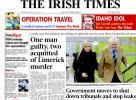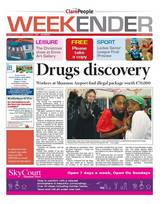Services
Contents:
- About Media Relations
- Media Releases
- Media Advisories
- Media Monitoring
- Press Photography Management
- Crisis Management
- Speech Writing
ABOUT MEDIA RELATIONS
Dunphy Media Relations is all about communicating your message to a target audience whether it is clients, journalists, the media or the general public.
DMR advises clients to adopt a ‘ proactive ’ rather than a ‘ reactive ’ approach. A ‘ proactive ’ approach entails the issuing of information to the media before a story is broken by the media. In other words, the company pre-empts the publication/broadcast of a story concerning it and the work it carries out. This approach will categorically state your position regarding any given story. It decreases the likelihood of the story being misinterpreted and published/broadcast by the media without a response from you or your organisation. A ‘ proactive ’ approach should also apply to positive stories emanating from the company’s work Your organisation should, at every possible opportunity, inform the public through the media and internal resources (i.e. online PR) about the good work it carries out on a daily basis. The common belief that the media sector is oblivious or unappreciative of positive good news stories is a fallacy. Newspapers will print and radio/TV stations will broadcast a story that grabs their attention and is of public interest.
A ‘ reactive ’ approach arises out of a potentially damaging and critical interpretation of your organisation’s work being printed or broadcast. Your organisation’s response through a media release is, primarily, a damage limitation exercise and is preventable and unnecessarily time-consuming. A ‘ reactive ’ approach, however, will always exist to some extent. Your organisation may often find itself issuing responses to the media as a result of negative coverage not foreseen by the company. Media requests for a statement on such stories should always be met with a response no matter how limited or short it is your organisation should be seen to be ‘open and transparent’ about its work. This extent and nature of this statement/response is dictated by the company. Journalists can request a certain type of response but ultimately it is the company which remains in control. The response should be measured, categorical and proactive.
To recap, a ‘ reactive ’ approach is required on occasion as it is impossible to foresee or predict the publication or broadcast of a certain story. However, a ‘ proactive ’ approach will minimise negative media coverage. It also ensures that there is not a potentially reputation damaging delay in a response being published/broadcast. In an age of blanket media coverage and opinionated journalism, it is imperative that a response is issued, whenever possible. Your organisation’s reputation, image and work should be protected and promoted at every given opportunity. The media values and acknowledges an organisation that is both responsive and co-operative. Such a healthy working relationship can only have positive benefits for your organisation.
MEDIA RELEASES
Your promotional campaigns should not be limited to advertising messages alone. There has been a rapid increase of advertising information within the media: every TV/radio broadcasting hour contains up to fifteen minutes of advertising messages while print publications are condensed with advertisements. The advertising alone does not suffice anymore to attract the people’s attention to your work. Free publicity resulting from a media release is one of the most cost effective promotion vehicles available to any organisation. A foolproof media release can save any organisation huge amounts of money normally spent on advertising. News editors receive scores, if not hundreds, of media releases each day. They give media releases a ‘10 second’ glance to see if the topic is newsworthy. Dunphy Public Relations recognises the need to grab the attention of news editors through concise yet informative headlines and short and snappy text.
Your organisation may be contacted by an individual journalist for comment on a given story. Once this has been formulated, it is advisable that the statement be issued en masse to all other journalists/media agencies. The HSE conducts such a policy and it has proven successful. This measure avoids the time-consuming situation whereby the same statement is repeated to other journalists who contact your organisation regarding the same. Media releases are formed as a result of:
- the launch of a new initiative
- change in the company that affects potential clients
- or an event that affects your industry
MEDIA ADVISORIES
Media Advisories are distributed a set period before an event takes place so journalists/reporters can plan on attending. Dunphy Public Relations provides media advisories to explain what the event is about, where the event will be held, what time, and who will attend/speak at the event. The first couple of sentences should serve to catch the reporter’s attention. These opening lines should also identify the newsworthiness of the occasion. A quote is not appropriate for an advisory if a client wishes the event not to be reported prior to its occurrence. In this case, DPR recommends the words “FOR PLANNING PURPOSES ONLY” should appear on advisories to alert the media that they may not use information contained in the advisory.
Dunphy Media Relations provides a service whereby the print and broadcasting media is monitored over a set period of time to allow clients to assess how it is being portrayed.
PRESS PHOTOGRAPHY MANAGEMENT
Dunphy Media Relations recognises the importance associated with representatives being available to generate goodwill for their organisation. Photo opportunities provide your organisation with a valuable opportunity to fill newspaper space. Similar coverage can prove to be very costly if pursued through advertising means. If you want to increase the chances of attaining press coverage, DMR recommends that photographs are included in media releases. For the majority of publications, a colour photograph is advisable.
CRISIS MANAGEMENT
Crises can be defining moments for an organisation’s reputation and often strike when a company seems least prepared. Most emergency situations can be predicted, and so Dunphy Media Relations works with clients to map response strategies before management finds itself in trouble. Your organisation could, at any stage, find itself facing a number of unforeseen scenarios such as:
- Public attacks on product integrity
- A clients withdrawal from a contract
- Inaccurate information concerning your organisation being published/broadcast
- management changes
- funding announcements
DMR encourages your organisation to examine its own crisis management; it is only after the event, that contingency preparation and investment will have a positive impact on the company’s balance sheet.
SPEECH WRITING
Preparing and delivering a public speech can be an intimidating and time consuming matter. Some people are naturally talented at public speaking, but others find the affair daunting. Individuals can find it difficult deciding what to say and how to say it. Dunphy Public Relations prepares speeches to be delivered at corporate events, media conferences, public awards and industry gatherings. Presentations can also be designed and pre-prepared by DMR.
The contents of your speech, and how you deliver it, are based on three important factors: the occasion, the audience and the purpose of your speech
DMR adopts a policy of researching a speech, writing spoken English, making speeches interesting, making facts memorable, using statistics and making a speech appropriate to the speaker, audience and occasion
* A sample speech prepared by DMR is available on request.











